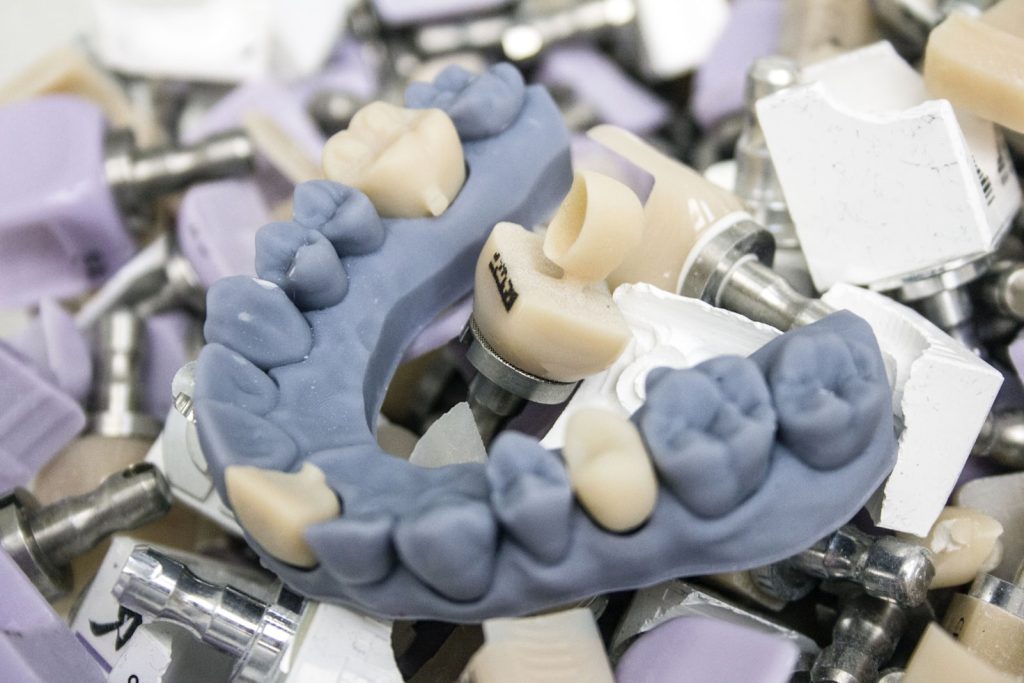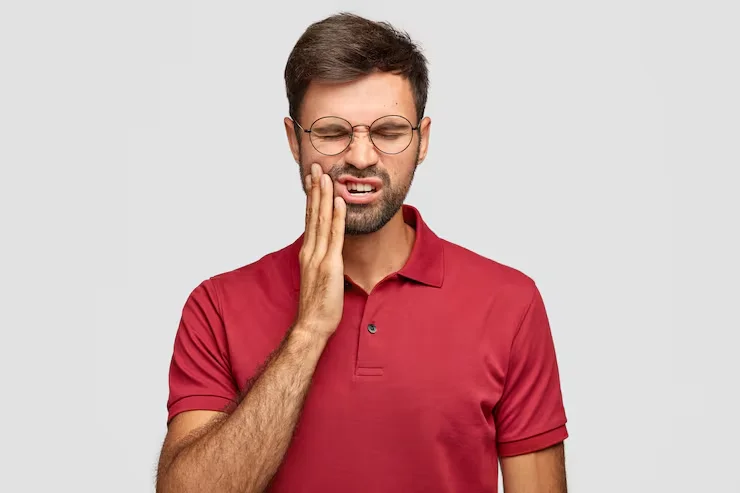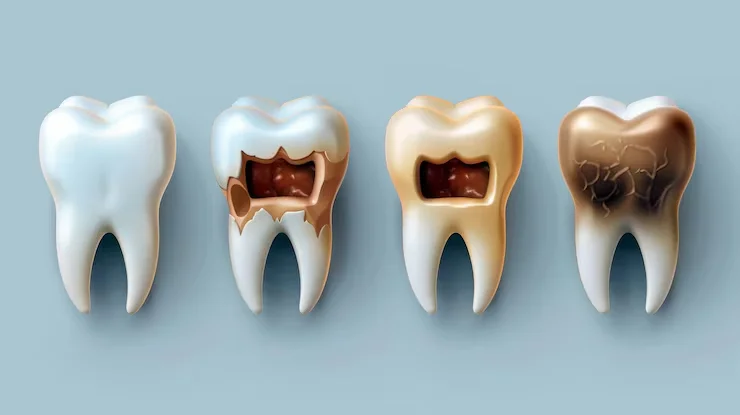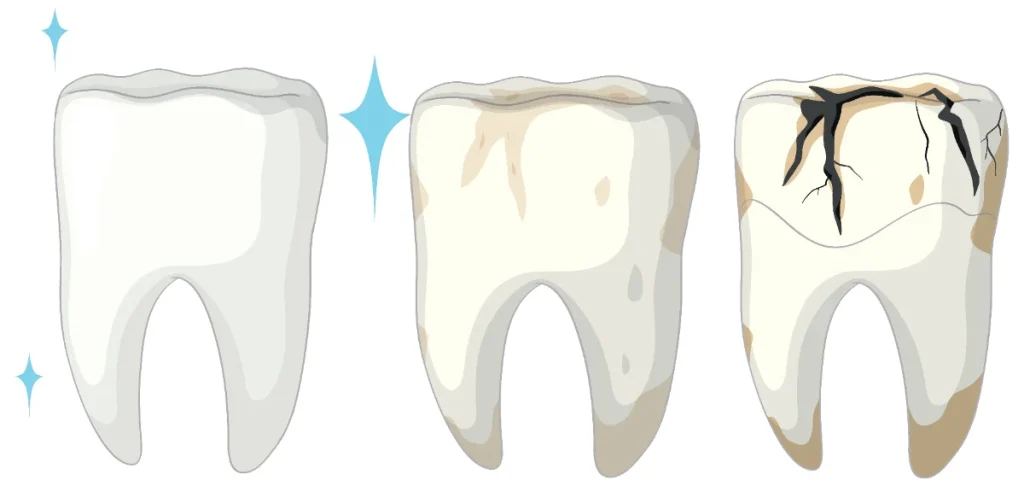Dental crowns are essential restorations use to protect and strengthen compromise teeth. Made from durable materials, they help maintain oral function and aesthetics.
However, like all dental restorations, crowns are not indestructible. Over time, they can wear down, become loose, or sustain damage, requiring a crown replacement procedure.
In this guide, we’ll cover why crowns need to be replace, key signs to look for, types of crowns, costs, and how to choose the right dentist.
Types of Dental Crowns
Different materials are use to fabricate the crown depending on the individual requirement. The material of a dental crown significantly affects its durability, aesthetics, and cost. Common types of crowns include:
- Porcelain Crowns: They are the most preferred option for front teeth because they are highly aesthetic and natural-looking.
- Metal Crowns (Gold or Silver Alloy): Incredibly durable and highly fracture-resistant. They require minimal reduction of the natural tooth. However, they are not aesthetically pleasing and are not usually preferred by patients.
- Porcelain-Fused-to-Metal (PFM) Crowns: These are metal crowns fused with porcelain. They offer a perfect blend of durability and aesthetic appeal with a natural appearance.
- Zirconia Crowns: Zirconia crowns are incredibly durable, resistant to wear, and blend perfectly with natural teeth. Unlike porcelain, they are strong and can withstand high forces.
- Composite Resin Crowns: Affordable but less durable than other types.
What is Dental Crown Replacement?
Dental crown replacement involves removing an old or damaged crown and placing a new one to restore the tooth’s strength, function, and aesthetics.
- Protects the tooth from further decay or fractures
- Ensures proper bite alignment and comfort
- Prevents gum infections and underlying complications
A timely crown replacement procedure preserves the tooth structure and enhances long-term oral health.
Do Crowns Need to Be Replaced?
Dental crowns do not last indefinitely and often require replacement due to natural wear and tear, structural damage, or underlying dental conditions. Their lifespan depends on various factors, such as the choice of material, oral hygiene habits, para-functional habits such as bruxism, and dietary habits.
Common reasons for crown replacement include:
- Wear and Tear: Crowns sustain structural wear and tear over time, reducing their strength, especially in people who grind their teeth. Abnormal occlusal forces produce faster dilapidation.
- Decay Underneath the Crown: If the defective crown is not removed timely, it can become a breeding ground for microbes that infiltrate from the damaged part or margins of a dental crown. The bacteria can contaminate the underlying natural tooth, leading to decay and infection.
- Gum Recession: Bacterial accumulation underneath the damaged crown can cause gum infections and recession, increasing the risk of gingivitis and sensitivity.
- Pain and Discomfort: Loose or dislodged crowns can cause pain and discomfort when biting food. They can also contribute to sensitivity to hold and cold foods.
- Tooth loss: Extensive decay can lead to tooth extraction if the issue is neglected for longer.
- Aesthetic concerns: Damaged crowns, especially PFM after chipping of porcelain, expose the metal underneath, which impacts the appearance of the individual.
Signs You Need Dental Crown Replacement
To prevent future dental complications, avoiding early signs of crown damage is vital. Recognizing the replacement indicators can help with early replacement and protect the integrity of the underlying tooth structure.
Typical indications that a crown needs replacement include:
- Pain or Sensitivity: Pain or sensitivity in the crowned tooth suggests the presence of infection, decay, or exposure to dental structure.
- Visible Cracks or Fractures: If you can spot the fracture or chipped part of the crown, the crown replacement procedure must be done as soon as possible.
- Loose or Dislodged Crown: A crown that moves or shifts needs immediate replacement to avoid infection.
- Gum Recession and Swelling: Bacteria buildup under the crown’s edge can cause gum irritation, infection, and recession.
- Unpleasant Odor or Taste: Persistent infection around the crown results in a bad taste or metallic taste in the mouth with constant bad breath.
- Changes in biting pattern: A loose or ill-fitted crown can cause changes in bite and discomfort. Changes in tooth alignment can also cause jaw pain.
How Many Times can a Crown Be Replaced?
A dental crown can be replace multiple times, depending on the healthy tooth structure and the patient’s biting forces. Patients with habits such as bruxism are more likely to damage the structure of the dental crown repeatedly.
Frequent crown replacements can affect the structural integrity of the underlying tooth as they require reshaping during each replacement, ultimately weakening the tooth. If a tooth becomes too compromised, the dentist may consider extracting it and opting for alternative restoration options, such as implants or dentures.
Cost of Crown Replacement
The cost of crown replacement depends on the choice of material, the location of the dental clinic, and the expertise and qualification of the dentist. Usually, the cost ranges from 500$ to 3000$ per tooth. Additional costs may apply if the tooth beneath requires any filling or root canal
Dentists may provide a free crown replacement, depending on the cause and whether the warranty is still valid. Some instances where a dentist may replace a crown at no charge include:
- Manufacturer defect
- Early failure due to poor skills
- Warranty period or insurance coverage.
Choosing a Dentist for Crown Replacement
Finding the right dentist for crown replacement is essential to ensure long-lasting results. When choosing a dentist, consider the following factors:
- Expertise in restorative dentistry (prosthodontics).
- Patient reviews and recommendations.
- Use of advanced technology for precise fitting.
- Warranty options for crowns.
- Flexible financing and insurance acceptance.
Conclusion
A well-fitted and properly maintained dental crown can last numerous years, preserving oral health and enhancing a patient’s smile. If you notice pain, cracks, or gum issues, don’t delay—schedule a consultation for a crown replacement procedure.
Get Expert Dental Crown Replacement in Osseo, MN!
Are you looking for a trusted dentist in Osseo? Osseo Family Dental provides high-quality crown replacement services using advanced techniques and durable materials.Book an appointment with us at (763) 425 – 2626 or visit o directly at 30 Central Ave, Osseo, MN 55369





